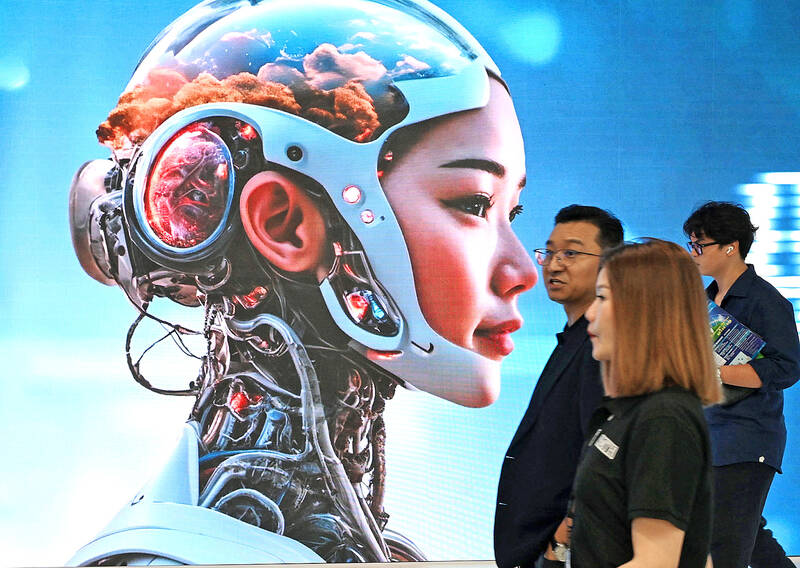Taiwan should fight for discursive dominance in artificial intelligence (AI)-related issues, rather than serving as merely an original equipment manufacturer (OEM) of AI systems, an Asia Group expert said yesterday.
The business consulting group on Wednesday published a report titled “Everything, everywhere, all at once: the emerging AI governance in Indo-Pacific and its implications for data-driven businesses.”
The report states that in AI governance, there are two main categories of countries in the Indo-Pacific region: pro-innovation and pro-security.

Photo: Chang Chia-ming, Taipei Times
“Our findings suggest that … Indo-Pacific economies’ national AI strategies are more likely to diverge than converge… Compounding this challenge is the US’ current aversion to taking the lead in setting regional standards,” the report said.
The report also said that China, with its security-focused political system, is keen to export its AI governance model abroad.
Taiwan adopts a “pro-innovation rule-taking” framework in AI governance, the report said
“As the world’s largest contributor to advanced semiconductor manufacturing and production, Taiwan is well-positioned to effectively develop and integrate AI at home,” the report said.
“However, the island’s contested sovereignty and ensuing exclusion from many international institutions will limit Taipei’s ability to set the global AI policy agenda,” it added.
George Chen (陳澍), managing director and head of the Hong Kong and Taiwan offices and cochair of digital practice for The Asia Group, said Taiwan paid early attention to AI governance compared with other nations in the region and has kept up with global trends.
Taiwan has an absolute advantage in AI hardware and is a little behind in AI software, Chen said, adding that the government should consider how to make sure the latter can catch up with the former through supporting policies.
Now is the time to set game rules of how AI should be developed, he said.
“After you have the AI draft act passed at the legislature, you should consider how to export Taiwan’s AI governance experiences to the world. You should fight for discursive dominance in AI in the international community through democratic allies, such as the US and Japan,” Chen said.
“It would be a pity if Taiwan serves only as an OEM in the AI era,” Chen added.
Countries around the world are currently seeking to establish AI governance principles, although progress has varied. The US has only used AI executive orders and state government bills, while the EU’s first AI law took effect last month.
The Ministry of Digital Affairs announced a draft AI basic act on July 15, which, if passed by the legislature would make Taiwan only the second country to have an AI law.

Taiwan is stepping up plans to create self-sufficient supply chains for combat drones and increase foreign orders from the US to counter China’s numerical superiority, a defense official said on Saturday. Commenting on condition of anonymity, the official said the nation’s armed forces are in agreement with US Admiral Samuel Paparo’s assessment that Taiwan’s military must be prepared to turn the nation’s waters into a “hellscape” for the Chinese People’s Liberation Army (PLA). Paparo, the commander of the US Indo-Pacific Command, reiterated the concept during a Congressional hearing in Washington on Wednesday. He first coined the term in a security conference last

Prosecutors today declined to say who was questioned regarding alleged forgery on petitions to recall Democratic Progressive Party (DPP) legislators, after Chinese-language media earlier reported that members of the Chinese Nationalist Party (KMT) Youth League were brought in for questioning. The Ministry of Justice Investigation Bureau confirmed that two people had been questioned, but did not disclose any further information about the ongoing investigation. KMT Youth League members Lee Hsiao-liang (李孝亮) and Liu Szu-yin (劉思吟) — who are leading the effort to recall DPP caucus chief executive Rosalia Wu (吳思瑤) and Legislator Wu Pei-yi (吳沛憶) — both posted on Facebook saying: “I

The Ministry of Economic Affairs has fined Taobao NT$1.2 million (US$36,912) for advertisements that exceed its approved business scope, requiring the Chinese e-commerce platform to make corrections in the first half of this year or its license may be revoked. Lawmakers have called for stricter enforcement of Chinese e-commerce platforms and measures to prevent China from laundering its goods through Taiwan in response to US President Donald Trump’s heavy tariffs on China. The Legislative Yuan’s Finance Committee met today to discuss policies to prevent China from dumping goods in Taiwan, inviting government agencies to report. Democratic Progressive Party Legislator Kuo Kuo-wen (郭國文) said

The Ministry of Economic Affairs has fined Taobao NT$1.2 million (US$36,900) for advertisements that exceeded its approved business scope and ordered the Chinese e-commerce platform to make corrections in the first half of this year or its license would be revoked. Lawmakers have called for stricter supervision of Chinese e-commerce platforms and more stringent measures to prevent China from laundering its goods through Taiwan as US President Donald Trump’s administration cracks down on origin laundering. The legislature’s Finance Committee yesterday met to discuss policies to prevent China from dumping goods in Taiwan, inviting government agencies to report on the matter. Democratic Progressive Party